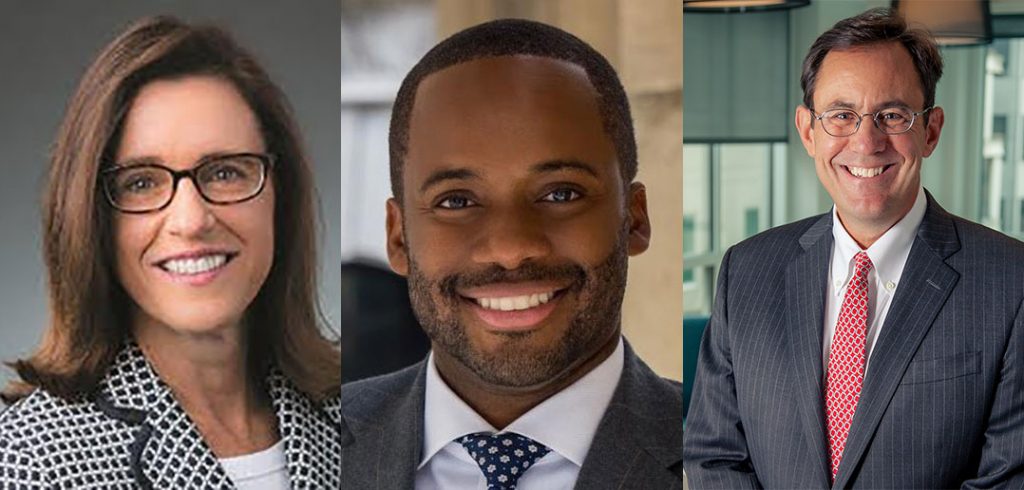The combination of a Jesuit education with a New Yorker’s tenacity and sense of purpose is what helps Fordham graduates stand out in the job market.
That’s according to three members of the Fordham University President’s Council—Maureen Beshar, FCLC ’86, Errol Pierre, GABELLI ’05, and Ed Sisk, FCRH ’85—who shared their stories and experiences with Fordham students and others on Sept. 14. The online panel discussion, “Born, Bred, and Making it in New York City,” was part of the council’s Executive Leadership Series.
“There’s just something about a Fordham student that has Jesuit values, and wants to be a global citizen and give back to their community,” said Pierre, a senior vice president at Health First, the largest nonprofit health insurance company in New York. “And I think there’s something intangible that just comes with” living, studying, and working in New York City.
Putting Fordham Lessons into Practice
When Sisk, the managing director and head of public finance at Bank of America Merrill Lynch, was put in charge of the company’s banking division after the 2008 financial crisis, he said that he used values he learned at Fordham years ago to help manage his team through it.
“For an organization to be successful, it has to be driven by core values,” he said. “We define our core values as: we focus on our clients, we work hard, we conduct ourselves with integrity, we win or lose as a team—that’s how I assess how people do their jobs.”
Beshar, a managing director and CEO of North America for Robeco, an asset management firm, said that in her field, she has to explain complex situations and solutions to clients, and her Fordham education helps her do that effectively.
“I think Fordham really helped me question things in a way that I might not have done before,” she said.
Seizing Opportunities to Explore Career Options
When Pierre started at Fordham, he wasn’t sure what he wanted to do. He enrolled in the business school because he wanted to look like “the guy with the dress shoes and the suit whipping around The Wall Street Journal on the subway,” he said. But while he was at Fordham, he decided to use the internship opportunities presented to him to explore several fields.
“Internships really drove me to my passion,” he said. “I was glad I was in the city, because I had a lot of friends that went to other schools that didn’t have the plethora of opportunities for internships, as I did being so close to Manhattan.”
He started out interning for a life insurance company and quickly realized that wasn’t for him. “After two weeks, I was like, ‘I can’t do this,’ which was fine,” he said. “The beautiful thing about internships is, if you find that you don’t like something, that’s just as valuable” as finding something you like.
He then tried interning at a bank but found that the role was often about “helping rich people get richer.”
“Even though I was in the business school, we still had to take philosophy, we still had to take religion—I didn’t know why I still had to take those classes—but then I learned, ‘Oh, I’m graduating with a conscience and as a global citizen,’” Pierre said.
That led him to his third internship, at Blue Cross Blue Shield. He started out doing data entry, but over the next 10 years there, he learned more about aspects of the insurance business that interested him, such as “coverage gaps—why some things are covered, why things aren’t,” and disparities in health care.
“I would not be in my line of business if it was not for interning while I was at Fordham,” he said.
Thinking Differently
When Beshar first enrolled at Fordham, she was working two jobs—one at a local deli and one at a hospital—to help pay for the cost of school. After her first year, she had to drop out and ended up taking an entry-level position at Merrill Lynch to save some money. Beshar knew that if she wanted to advance in her field, she had to go back to school, and when she did, she returned to Fordham and decided to study something that would help her think differently and stand out—philosophy.
“Going to Fordham, it almost felt like coming home again,” she said. “With my interest in philosophy, and trying to be a little bit analytical, Fordham … was a natural choice. … It was very exciting, and I think gave me exposure to so many opportunities, so many different people, so many different experiences.”
Tapping Into with the Alumni Network
One of the pieces of advice the panelists gave to students and those in attendance was to reach out to those who preceded them at Fordham, particularly because they all now share a bond with the school and the city they called home for at least four years.
“One of the reasons to love being a Fordham New Yorker is there’s so darn many of us, and we’re thriving where we are doing business and we are mentoring,” said Sisk, who added that he’s always available to offer advice to Fordham students.
Beshar said that she’s seen and benefited from the positive impacts of the alumni network.
“What you learn and the support you get and just the networking —if you’re open to learning, I think it’s always there” for you, she said.

